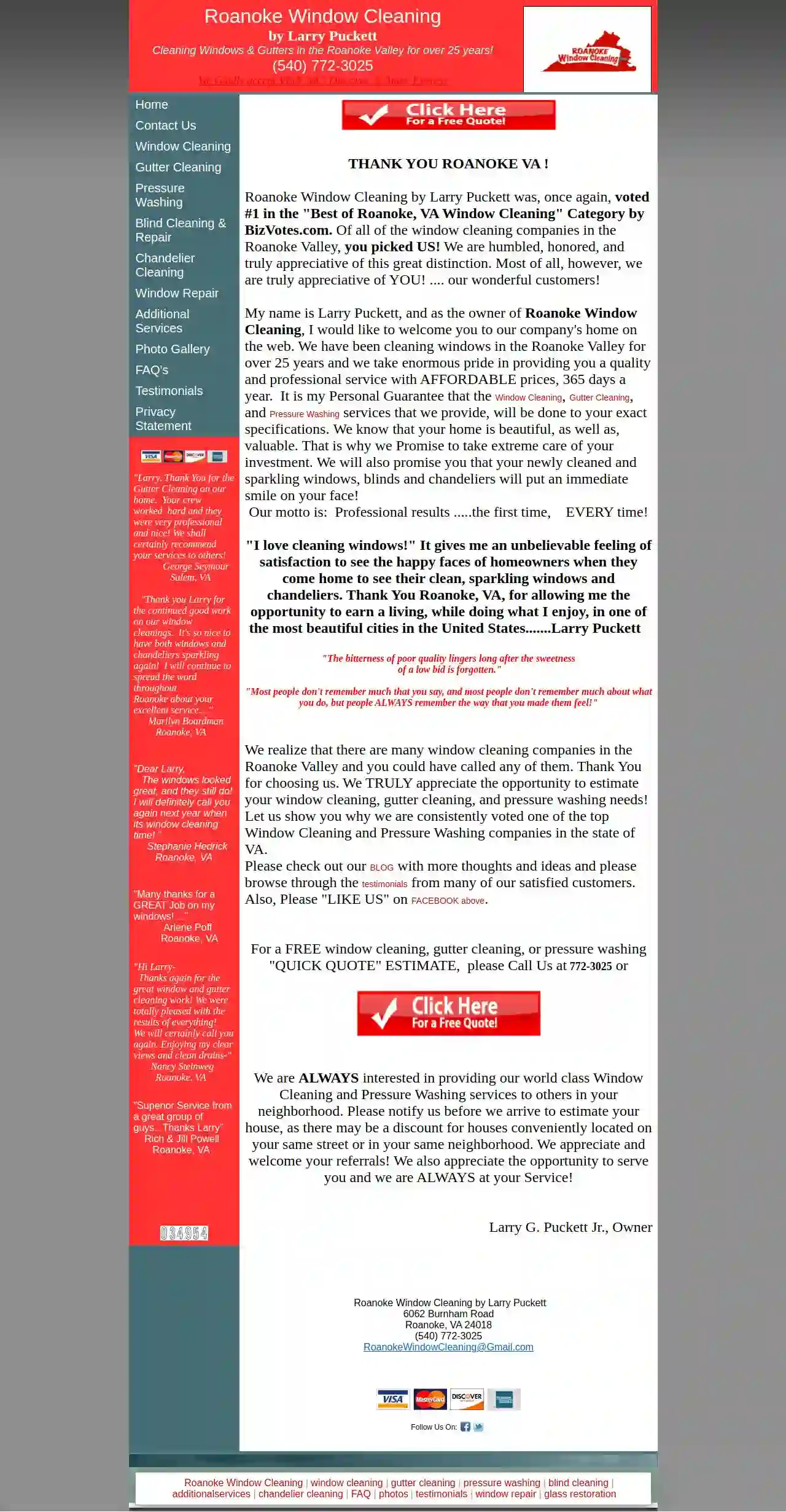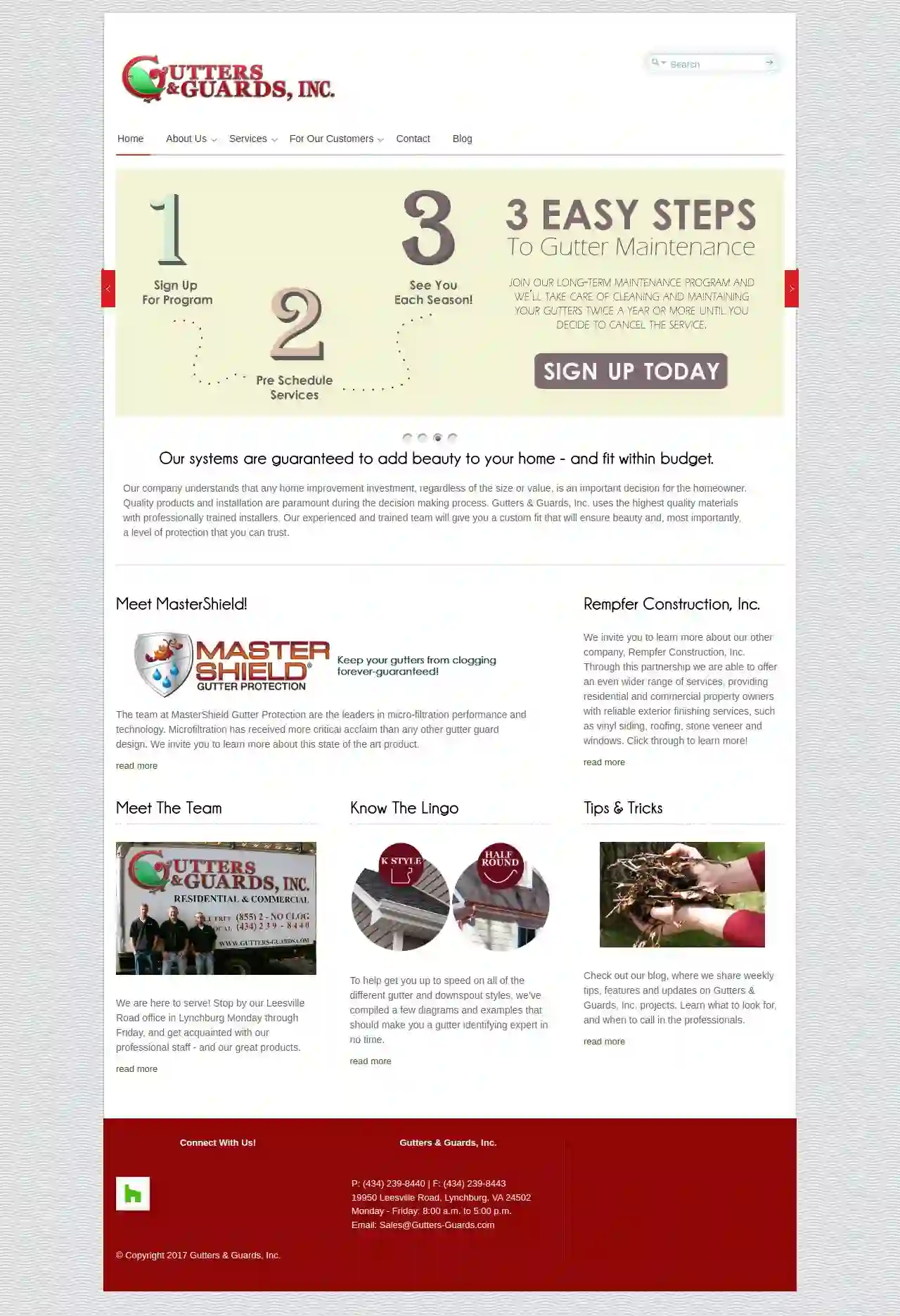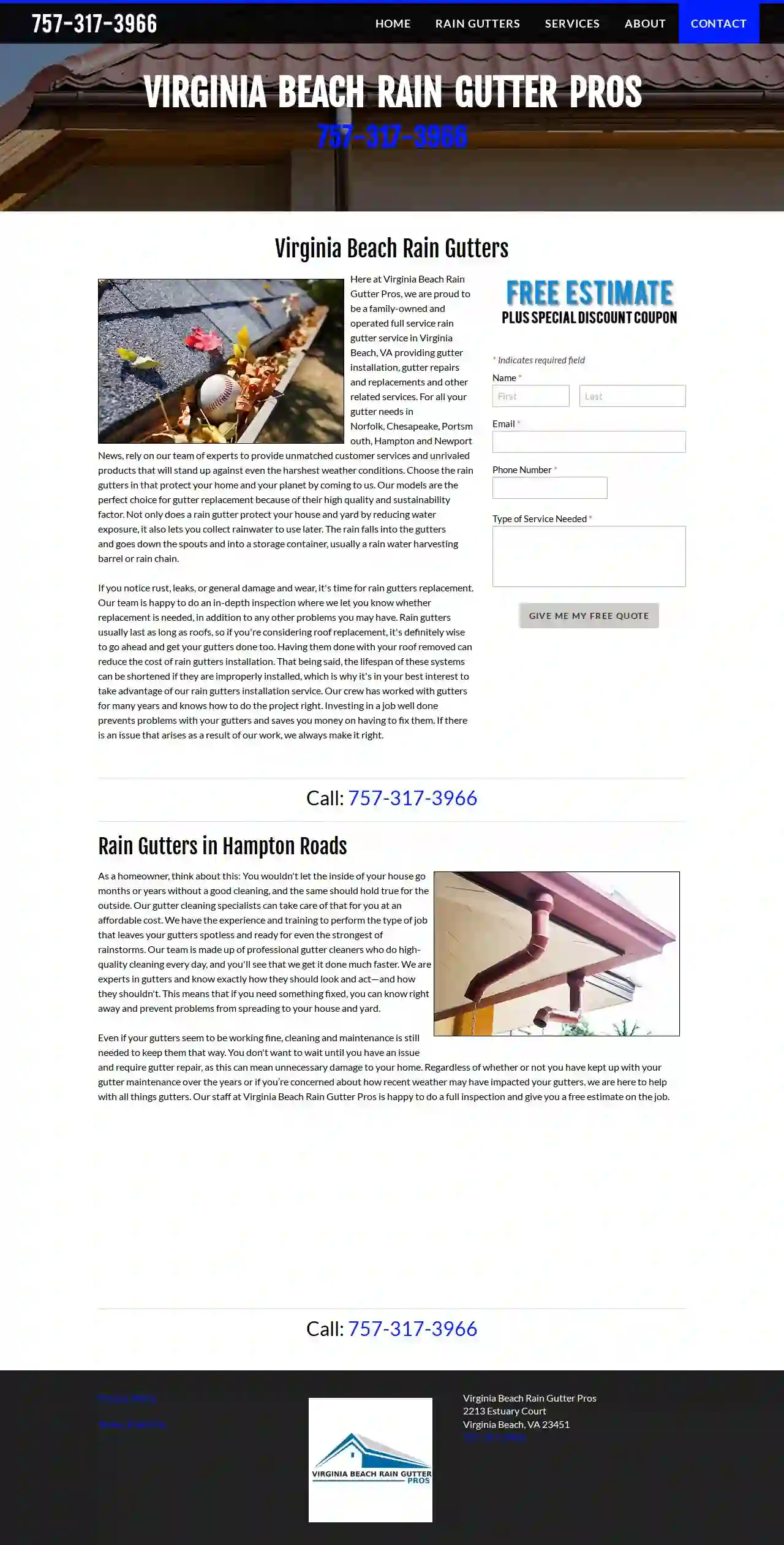Gutter Cleaning Cave Spring
Find top Gutter Cleaning and Repair in Cave Spring
Get 3 FREE Gutter Cleaning and Repair quotes for your project today! Compare profiles, reviews, accreditations, portfolio, etc... and choose the best service.

Seamless Aluminum Guttering Co
4.210 reviews4524 Melrose Ave, Roanoke, 24017, USSeamless Aluminum Gutting & Siding Company was established in 1989 by Dan and Nathan Marshall to provide you with the best quality products, prices and service available. We work hard to serve you and welcome and appreciate your business. Seamless Aluminum Gutting & Siding is a local family owned and operated business that serves Roanoke, Salem, Vinton, Christiansburg, Blacksburg, New Castle and the surrounding counties. We are fully licensed and insured. At Seamless Aluminum Guttering & Siding Company we are committed to providing quality service and workmanship on all projects that we undertake. Our satisfied customers are our most valuable customers.
- Services
- Why Us?
- Our Team
- Gallery
Get Quote
Roanoke Window Cleaning by Larry Puckett
4.767 reviewsRoanoke, USRoanoke Window Cleaning by Larry Puckett has been cleaning windows in the Roanoke Valley for over 25 years. We take enormous pride in providing a quality and professional service with affordable prices, 365 days a year. It is my Personal Guarantee that the Window Cleaning, Gutter Cleaning, and Pressure Washing services that we provide, will be done to your exact specifications. We know that your home is beautiful, as well as, valuable. That is why we are committed to providing you with the best service possible.
- Services
- Why Us?
- Our Team
- Testimonials
- Gallery
Get Quote
ProGutters
4.956 reviewsRoanoke, VA, USProGutters is a locally owned and operated business in Roanoke, Virginia. We've been in the industry for years and we started this company because in our industry there is a poor lack of customer appreciation and value. The expensive prices being charged for gutter services and the poor work being performed did not match. We're here to change that experience. We provide five-star services that are affordable and fit your budget. Our services include gutter cleaning services, gutter cover and gutter guard installations, downspout installations, seamless gutters, gutter repairs and all other gutter services.
- Services
- Why Us?
- Testimonials
- Gallery
Get Quote
GUTTER DOCTOR
3.916 reviewsOffice: (703) 403-4714, E-Mail: [email protected], Springfield, VA., 22153, USGUTTER DOCTOR We Keep Homes Happy & Healthy! Home Gutter Cleaning Gutter Guards Gutter Repairs Roofing Services Holiday Decorating Save $$$ Now! Snow & Ice Removal FAQ Order Online! About Us Testimonials Employment Legal Page
- Services
- Why Us?
- Testimonials
- Gallery
Get Quote
Chesapeake Seamless Gutters
51 reviewsChesapeake, USChesapeake Seamless Gutters is dedicated to protecting your home or commercial building from water damage. We understand that gutters are crucial for diverting rainwater away from your foundation, roof, siding, and basement, preventing costly repairs down the line. Our team of experts provides a comprehensive range of services, including gutter cleaning, repair, and installation, ensuring your gutters are always in top condition. We specialize in both residential and commercial gutters, offering a variety of options to suit your needs, such as box gutters, half-round gutters, and seamless gutters. We also offer soffit and fascia repair services to complete your home's exterior protection. At Chesapeake Gutter, we take pride in our quality workmanship and commitment to customer satisfaction.
- Services
- Why Us?
- Gallery
Get Quote
The Brothers that just do Gutters
520 reviewsFairfax, VA, 22030, USAt our core, we are a gutter contractor deeply rooted in community values, placing our clients at the center of everything we do. We value our employees and invest in their growth, understanding that their expertise and dedication contribute to delivering a stellar experience for our clients. Honesty, integrity, and transparency are the guiding principles that shape our approach. We embrace all reviews, be they positive or negative, as we believe in complete openness. This commitment not only keeps us accountable but also serves as a valuable learning tool to continuously improve our services. Through our unwavering dedication, we have fostered enduring relationships with numerous clients who have become more than just customers – they have become our friends and neighbors, some of whom you may already know! As a community-minded business, our focus extends beyond mere transactions. Our dedication to providing a 5-star experience stems from our belief that exceptional service should be the norm. We understand that by prioritizing integrity and transparency, we earn the trust and loyalty of our clients. Our commitment to sharing all reviews demonstrates our genuine desire for improvement, ensuring that we constantly refine our skills as service professionals. This unwavering commitment has not only allowed us to cultivate a loyal customer base but has also facilitated meaningful connections with our clients, who often reside in the same neighborhoods as you. When you choose us, you not only choose a gutter contractor, but you also gain a team of professionals dedicated to delivering excellence while building a close-knit community of satisfied homeowners.
- Services
- Why Us?
- Gallery
Get Quote
The Brothers that just do Gutters
4.8194 reviews18225 Leesville Rd, Lynchburg, 24501, USThe Brothers that just do Gutters – A Gutter Contractor in Lynchburg, VA Our focus is to be your five-star gutter installation, gutter guard, and gutter cleaning contractor throughout Lynchburg and the surrounding areas. We are a community minded, client-focused gutter contractor who understands the importance in investing in our employees, and providing our clients with a 5-star experience. We believe in the importance of honesty, integrity, and transparency. Because of this, we are fully committed to posting every review – positive, or negative! We do this to not only keep ourselves honest, but to also use as a learning tool to better ourselves as service professionals. As a result, we have gained not only many loyal clients, but also, friends and neighbors. You may even recognize some of them as your own neighbors! Protecting Your Home Varying aspects of your home’s roofline, pitch, overhang, fascia, and valleys all need to be taken into consideration when a gutter installation is designed and performed on your home. Our Solutionists© will evaluate your home and plan a gutter replacement or a brand new seamless gutter installation that best fits your needs. We take cutting-edge technology and implement it with the industry’s best materials to design your custom gutter system. Overtime, water can do serious damage to your home’s structure, foundation, and property. A gutter and drainage system are just one of the key ways of directing water away from it. That’s why we strive to offer a full range of related gutter contractor services and products in addition to gutter guards, gutter installation, gutter cleaning, and gutter maintenance.
- Services
- Why Us?
- Gallery
Get Quote
GUTTERS & GUARDS INC
4.819 reviews19950 Leesville Road, Lynchburg, 24502, USGutters & Guards, Inc. is dedicated to providing high-quality gutter services to homeowners in Lynchburg, VA. We understand that any home improvement investment is a significant decision, and we prioritize quality products and professional installation. Our experienced team uses the highest quality materials to ensure both beauty and reliable protection for your home. We are proud to offer the MasterShield Gutter Guard System, a leader in micro-filtration technology. This state-of-the-art product has received widespread acclaim for its performance. In addition to our gutter services, we partner with Rempfer Construction, Inc. to offer a wider range of exterior finishing services, including vinyl siding, roofing, stone veneer, and windows. Visit our Leesville Road office in Lynchburg to meet our professional staff and learn more about our products and services. We are committed to providing exceptional service and exceeding your expectations.
- Services
- Why Us?
- Gallery
Get Quote
The Painting Craftsmen
4.9112 reviews8775 Arlington Expressway, #103, 8775 Arlington Expressway #103, Jacksonville, 32211, USWelcome to The Painting Craftsmen, a boutique painting company serving Jacksonville, FL. Our goal is simple—to be the best painting company you’ve ever invited to your home. The Painting Craftsmen is a locally owned, full-service residential painting contractor offering free, no-obligation, in-home estimates to all homeowners in the greater Jacksonville area looking for a painting company with the highest standards of excellence. The Painting Craftsmen is exactly the kind of painting company the name suggests. We are artisan craftsmen who view our residential painting service as a craft to perfect, a work of art to explore. We want to transform your home through the professional application of fine finishes throughout your home, both inside and out. At The Painting Craftsmen, we stand behind the quality of not only the finished product but also the quality of the experience you will have working with us. For the protection of your home, we are licensed, fully insured, and Lead-Safe Certified. We provide the care, cleanliness, and commitment to excellence that you expect from a painting company, and for your home. We are expert painters and refinishers trained in a variety of painting services including interior and exterior painting, deck refinishing, drywall repair, and more. Whether you are looking to reinvent the look of your home or renew your existing paint job, The Painting Craftsmen will work with you to achieve the look and feel you have envisioned for your home and provide the quality and craftsmanship you expect. We hope that you’ll take a few minutes to review our list of mastered interior painting and exterior painting services and then contact us to find out how we can assist you with your next painting project. We look forward to being your painting craftsmen of choice!
- Services
- Why Us?
- Accreditations
- Gallery
Get Quote
Virginia Beach Rain Gutter Pros
51 reviewsVirginia Beach, VA, 2213 Estuary Court, 23451, USAt Virginia Beach Rain Gutter Pros, we are proud to be a family-owned and operated full service rain gutter service in Virginia Beach, VA providing gutter installation, gutter repairs and replacements and other related services. For all your gutter needs in Norfolk, Chesapeake, Portsmouth, Hampton and Newport News, rely on our team of experts to provide unmatched customer services and unrivaled products that will stand up against even the harshest weather conditions. Choose the rain gutters that protect your home and your planet by coming to us. Our models are the perfect choice for gutter replacement because of their high quality and sustainability factor. Not only does a rain gutter protect your house and yard by reducing water exposure, it also lets you collect rainwater to use later. The rain falls into the gutters and goes down the spouts and into a storage container, usually a rain water harvesting barrel or rain chain. If you notice rust, leaks, or general damage and wear, it's time for rain gutters replacement. Our team is happy to do an in-depth inspection where we let you know whether replacement is needed, in addition to any other problems you may have. Rain gutters usually last as long as roofs, so if you're considering roof replacement, it's definitely wise to go ahead and get your gutters done too. Having them done with your roof removed can reduce the cost of rain gutters installation. That being said, the lifespan of these systems can be shortened if they are improperly installed, which is why it's in your best interest to take advantage of our rain gutters installation service. Our crew has worked with gutters for many years and knows how to do the project right. Investing in a job well done prevents problems with your gutters and saves you money on having to fix them. If there is an issue that arises as a result of our work, we always make it right.
- Services
- Why Us?
- Our Team
- Gallery
Get Quote
Over 60,241+ Janitorial Businesses registered
Our janitorial services operate in Cave Spring & surrounding areas!
CleaningMatch has curated and vetted Top Cleaning Services in Cave Spring. Find a reliable contractor today.
Frequently Asked Questions About Gutter Cleaning
- Hand Cleaning: Involves manually removing debris from gutters using gutter scoops, trowels, and other hand tools. It's effective for removing larger debris but can be time-consuming.
- Blowing: Uses blowers to remove leaves and debris from gutters. Effective for lighter debris but may not remove heavier or compacted materials.
- Vacuuming: Employs specialized gutter vacuums to suck up debris. Effective for removing both dry and wet debris, but may require specialized equipment.
- Pressure Washing: Uses pressure washers to flush out gutters and downspouts. Effective for removing stubborn debris but requires careful handling to avoid damaging gutters.
- Reduced Leaks: Seamless gutters have fewer seams, reducing the likelihood of leaks developing over time.
- Improved Appearance: Seamless gutters create a more aesthetically pleasing and streamlined look along your roofline.
- Less Maintenance: Fewer seams mean less opportunity for debris to accumulate, reducing the frequency of cleaning needed.
- Small House: Cleaning gutters on a small, single-story house may take 1-2 hours.
- Large or Multi-Story House: Cleaning gutters on a larger or multi-story house can take 3-4 hours or more.
What are the different types of gutter cleaning methods?
The best gutter cleaning method depends on the type of gutters, the amount and type of debris, and the gutter cleaner's preferences. Discuss your options with a professional gutter cleaning service to determine the most suitable method for your needs.
Do I need to be home for gutter cleaning?
However, it's a good idea to inform the company if you won't be home and provide any necessary instructions, such as gate codes or where to leave the debris bags. You may also want to be present for an initial assessment or walk-through to discuss your specific needs and any areas of concern.
What are seamless gutters, and are they better than sectional gutters?
Advantages of Seamless Gutters:
While seamless gutters offer advantages, sectional gutters are typically more affordable and easier to repair if a section becomes damaged. The best choice for your home depends on your budget, aesthetic preferences, and the length and complexity of your roofline.
How long does it take to clean gutters?
Additional services like gutter repair or gutter guard installation will add to the overall time required.
What are the different types of gutter cleaning methods?
- Hand Cleaning: Involves manually removing debris from gutters using gutter scoops, trowels, and other hand tools. It's effective for removing larger debris but can be time-consuming.
- Blowing: Uses blowers to remove leaves and debris from gutters. Effective for lighter debris but may not remove heavier or compacted materials.
- Vacuuming: Employs specialized gutter vacuums to suck up debris. Effective for removing both dry and wet debris, but may require specialized equipment.
- Pressure Washing: Uses pressure washers to flush out gutters and downspouts. Effective for removing stubborn debris but requires careful handling to avoid damaging gutters.
The best gutter cleaning method depends on the type of gutters, the amount and type of debris, and the gutter cleaner's preferences. Discuss your options with a professional gutter cleaning service to determine the most suitable method for your needs.
Do I need to be home for gutter cleaning?
However, it's a good idea to inform the company if you won't be home and provide any necessary instructions, such as gate codes or where to leave the debris bags. You may also want to be present for an initial assessment or walk-through to discuss your specific needs and any areas of concern.
What are seamless gutters, and are they better than sectional gutters?
Advantages of Seamless Gutters:
- Reduced Leaks: Seamless gutters have fewer seams, reducing the likelihood of leaks developing over time.
- Improved Appearance: Seamless gutters create a more aesthetically pleasing and streamlined look along your roofline.
- Less Maintenance: Fewer seams mean less opportunity for debris to accumulate, reducing the frequency of cleaning needed.
While seamless gutters offer advantages, sectional gutters are typically more affordable and easier to repair if a section becomes damaged. The best choice for your home depends on your budget, aesthetic preferences, and the length and complexity of your roofline.
How long does it take to clean gutters?
- Small House: Cleaning gutters on a small, single-story house may take 1-2 hours.
- Large or Multi-Story House: Cleaning gutters on a larger or multi-story house can take 3-4 hours or more.
Additional services like gutter repair or gutter guard installation will add to the overall time required.